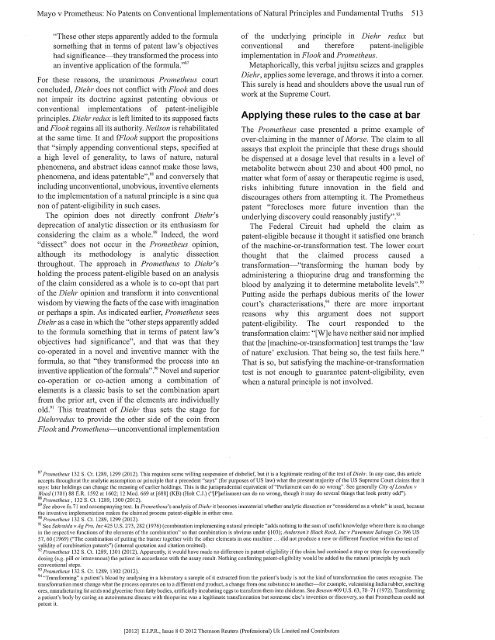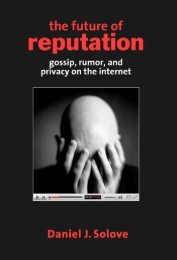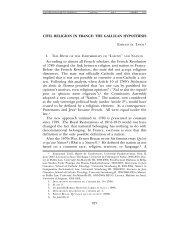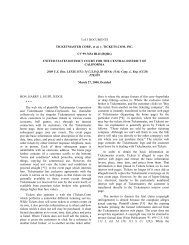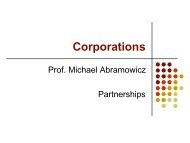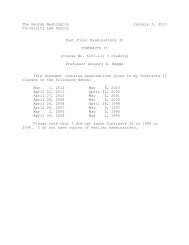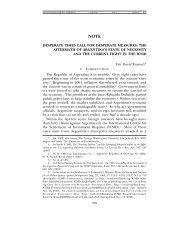Mayo v Prometheus - Gwu - George Washington University
Mayo v Prometheus - Gwu - George Washington University
Mayo v Prometheus - Gwu - George Washington University
You also want an ePaper? Increase the reach of your titles
YUMPU automatically turns print PDFs into web optimized ePapers that Google loves.
<strong>Mayo</strong> v <strong>Prometheus</strong>: No Patents on Conventional Implementations of Natural Principles and Fundamental Truths 513<br />
"These other steps apparently added to the formula<br />
something that in terms of patent law's objectives<br />
had significance-they transfonned the process into<br />
an inventive application of the formula." 87<br />
For these reasons, the unanimous <strong>Prometheus</strong> court<br />
concluded, Diehr does not conflict with Flook and does<br />
not impair its doctrine against patenting obvious or<br />
conventional implementations of patent-ineligible<br />
principles. Diehr redux is left limited to its supposed facts<br />
and Flook regains all its authority. Neilson is rehabilitated<br />
at the same time. It and fFlook support the propositions<br />
that "simply appending conventional steps, specified at<br />
a high level of generality, to laws of nature, natural<br />
phenomena, and abstract ideas cannot make those laws,<br />
phenomena, and ideas patentable", 88 and conversely that<br />
including unconventional, unobvious, inventive elements<br />
to the implementation of a natural principle is a sine qua<br />
non of patent-eligibility in such cases.<br />
The opinion does not directly confront Diehr's<br />
deprecation of analytic dissection or its enthusiasm for<br />
considering the claim as a whole. 89 Indeed, the word<br />
"dissect" does not occur in the <strong>Prometheus</strong> opinion,<br />
although its methodology is analytic dissection<br />
throughout. The approach in <strong>Prometheus</strong> to Diehr's<br />
holding the process patent-eligible based on an analysis<br />
of the claim considered as a whole is to co-opt that part<br />
of the Diehr opinion and transform it into conventional<br />
wisdom by viewing the facts ofthe case with imagination<br />
or perhaps a spin. As indicated earlier, <strong>Prometheus</strong> sees<br />
Diehr as a case in which the "other steps apparently added<br />
to the formula something that in terms of patent law's<br />
objectives had significance", and that was that they<br />
co-operated in a novel and inventive manner with the<br />
formula, so that "they transformed the process into an<br />
inventive application of the formula". 90 Novel and superior<br />
co-operation or co-action among a combination of<br />
elements is a classic basis to set the combination apmt<br />
from the prior art, even if the elements are individually<br />
old. 91 This treatment of Diehr thus sets the stage for<br />
Diehrredux to provide the other side of the coin from<br />
Flook and <strong>Prometheus</strong>-unconventional implementation<br />
of the underlying principle in Diehr redux but<br />
conventional and therefore patent-ineligible<br />
implementation in Flook and <strong>Prometheus</strong>.<br />
Metaphorically, this verbal jujitsu seizes and grapples<br />
Diehr, applies some leverage, and throws it into a corner.<br />
This surely is head and shoulders above the usual run of<br />
work at the Supreme Court.<br />
Applying these rules to the case at bar<br />
The <strong>Prometheus</strong> case presented a prime example of<br />
over-claiming in the manner of Morse. The claim to all<br />
assays that exploit the principle that these drugs should<br />
be dispensed at a dosage level that results in a level of<br />
metabolite between about 230 and about 400 pmol, no<br />
matter what form of assay or therapeutic regime is used,<br />
risks inhibiting future innovation in the field and<br />
discourages others from attempting it. The <strong>Prometheus</strong><br />
patent "forecloses more future invention than the<br />
underlying discovery could reasonably justify". 92<br />
The Federal Circuit had upheld the claim as<br />
patent-eligible because it thought it satisfied one branch<br />
of the machine-or-transfonnation test. The lower court<br />
thought that the claimed process caused a<br />
transformation-"transforming the human body by<br />
administering a thiopurine drug and transforming the<br />
blood by analyzing it to determine metabolite levels". 93<br />
Putting aside the perhaps dubious merits of the lower<br />
court's characterisations, 94 there are more important<br />
reasons why this argument does not support<br />
patent-eligibility. The court responded to the<br />
transformation claim: "[W]e have neither said nor implied<br />
that the [machine-or-transformation] test trumps the 'law<br />
of nature' exclusion. That being so, the test fails here."<br />
That is so, but satisfying the machine-or-transformation<br />
test is not enough to guarantee patent-eligibility, even<br />
when a natural principle is not involved.<br />
87 <strong>Prometheus</strong> 132 S. Ct. 1289, 1299 (2012). This requires some willing suspension of disbelief, but it is a legitimate reading of the text of Diehr. In any case, this article<br />
accepts throughout the analytic assumption or principle that a precedent "says" (for purposes of US law) what the present majority of the US Supreme Court claims that it<br />
says: later holdings can change the meaning of earlier holdings. This is the jurisprudential equivalent of"Parliament can do no wrong". Sec generally City of London v<br />
Wood (1701) 88 E.R. 1592 at 1602; 12 Mod. 669 at [688] (KB) (Holt C.J.) ("[P]arliament can do no wrong, though it may do several things that look pretty odd").<br />
88 <strong>Prometheus</strong>, 132 S. Ct. 1289, 1300 (2012).<br />
89 See above fn.7l and accompanying text. In <strong>Prometheus</strong>'s analysis of Diehr it becomes immaterial whether analytic dissection or "considered as a whole" is used, because<br />
the inventive implementation makes the claimed process patent-eligible in either case.<br />
90 <strong>Prometheus</strong> 132 S. Ct. 1289, 1299 (2012).<br />
91 Sec Sakraida vAg Pro, Inc 425 U.S. 273,282 (1976) (combination implementing natural principle "adds nothing to the sum of useful knowledge where there is no change<br />
in the respective functions of the elements of the combination" so that combination is obvious under§ I 03); Anderson:, Black Rock, Inc v Pavement Salvage Co 396 US<br />
57, 60 (1969) ("The combination of putting the burner together with the other elements in one machine ... did not produce a new or different function within the test of<br />
validity of combination patents") (intemal quotation and citation omitted).<br />
92 <strong>Prometheus</strong> 132 S. Ct. 1289, 1301 (20 12). Apparently, it would have made no difference in patent-eligibility if the claim had contained a step or steps for conventionally<br />
dosing (e.g. pill or intravenous) the patient in accordance with the assay result. Nothing conferring patent-eligibility would be added to the natural principle by such<br />
conventional steps.<br />
93 <strong>Prometheus</strong> 132 S. Ct. 1289, 1302 (2012).<br />
94 "Transforming" a patient's blood by analysing in a laboratory a sample of it extracted from the patient's body is not the kind of transformation the cases recognise. The<br />
transformation must change what the process operates on to a different end product, a change from one substance to another-for example, vulcanising India rubber, smelting<br />
ores, manufacturing fat acids and glycerine fi·om fatty bodies, artificially incubating eggs to transform them into chickens. See Benson409 U.S. 63, 70-71 (I 972). Transforming<br />
a patient's body by curing an autoimmune disease with thiopurine was a legitimate transformation but someone else's invention or discovety, so that <strong>Prometheus</strong> could not<br />
patent it.<br />
[2012] E.LP.R., Issue 8 © 2012 Thomson Reuters (Professional) Uk Limited and Contributors


